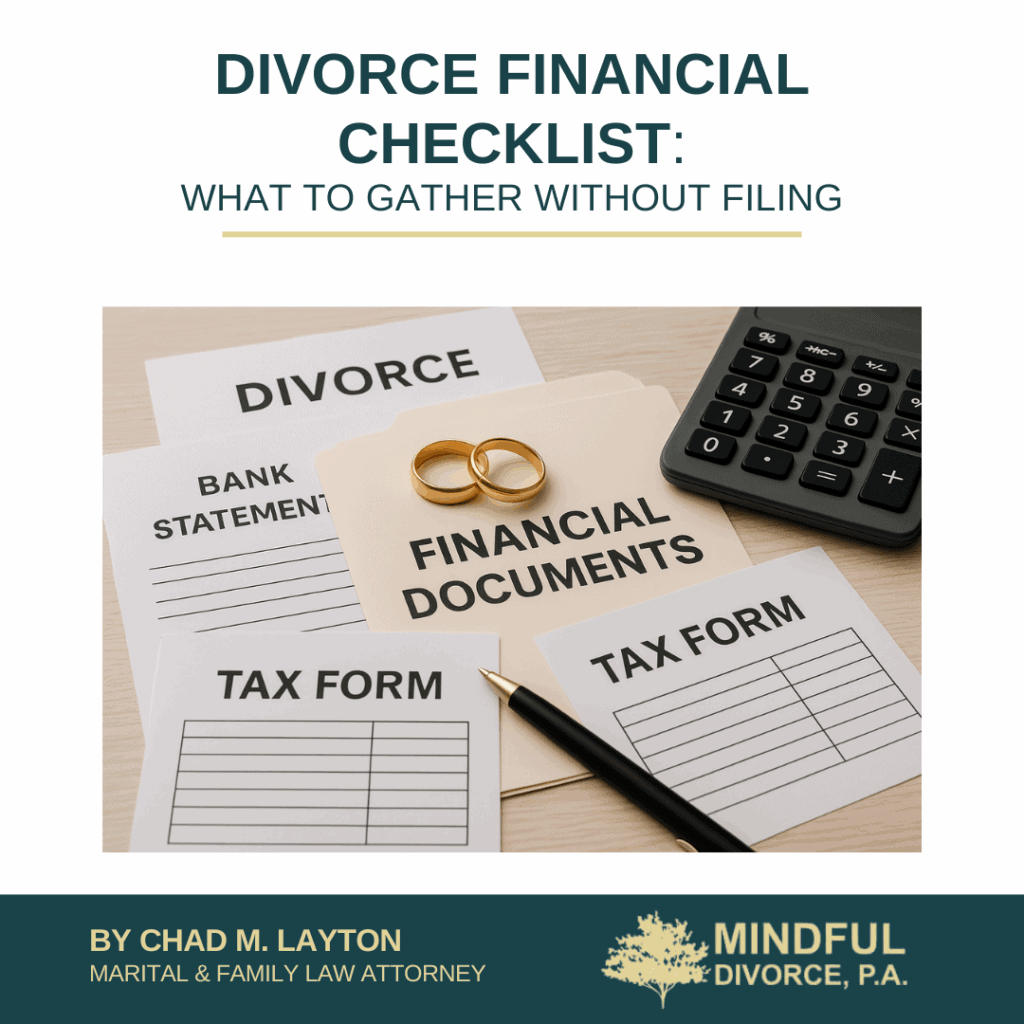
Thinking about filing for divorce in Florida raises one big question: What should you gather right now to protect your money and your future. Clear records calm the chaos, and they also help you understand your rights before anything is filed. At Mindful Divorce, P.A., we focus on peace of mind with transparent, fixed-fee services, so legal bills do not become another worry.
Below, you will find a practical checklist you can start using today. It walks through the documents and steps that help you get organized, reduce delays, and prepare for fair talks about property, support, and debt.
Why a Financial Checklist is Essential for Your Divorce
A solid checklist keeps all the pieces in one place, which helps with a fair division of property and debt. It also gives you the information needed for mediation or settlement talks.
When you can see income, assets, debts, and monthly costs on paper, choices get easier. You will be ready to talk about budgets, housing, and support with real numbers instead of guesswork.
Good preparation also avoids slowdowns in the legal process. Florida requires mandatory disclosure, and missing items can lead to delays or extra expense.
Key Financial Documents to Gather
Collecting and organizing your records now will save time later. Create digital copies in a private folder, and label each file by type and date for quick reference.
Income Records
Income documents show the court and your spouse what money comes in and from where. Try to pull a consistent set that covers recent years.
- Recent pay stubs, W-2s, and federal tax returns for the past 3 to 5 years.
- 1099s for freelance, contract, or investment income.
- Business income and expense records if you are self-employed.
- Social Security, pension, or retirement benefit statements.
- Proof of bonuses, commissions, or incentives.
Keep the most recent versions handy, then add older years as you find them. If you file jointly, save full copies of both spouses’ returns.
Bank and Investment Account Statements
Account statements help track where funds moved and what is jointly titled. Pull everything tied to your name or any joint ownership.
- Checking and savings statements for the last 6 to 12 months, including joint accounts.
- Brokerage statements, IRA and 401(k) statements, pension plan summaries, and CDs.
- Details for any cryptocurrency wallets or exchange accounts.
If you cannot access an account, make a list with the bank name, last four digits, and who holds the login, then bring that to your attorney.
Property and Asset Records
Real estate and titled property often make up a large share of marital wealth. Records help with valuation and equity calculations.
- Deeds and titles, mortgage statements, and payment history for all properties.
- Property tax bills and any recent appraisals or market analyses.
- Titles, registrations, and loan documents for cars, motorcycles, boats, or RVs, plus valuation estimates.
- Lists and appraisals for jewelry, art, collectibles, or other high-value items, with purchase receipts if available.
If an appraisal is old, note the date. A fresh valuation may be needed before settlement.
Debt and Liability Records
Every debt matters, even small balances. Gather full statements that show balances, rates, and payment terms.
- Mortgage loans, personal loans, car loans or leases, and credit card statements for the last 6 to 12 months.
- Student loan records, medical debt statements, and any other balances like payday or private loans.
Many couples forget medical bills and old tax balances. Add those to your list with account numbers and contact info.
Insurance Policies
Insurance touches support planning, parenting plans, and estate updates. Pull full policy pages, not just ID cards.
- Health, life, and disability policies, with beneficiary pages and coverage amounts.
Review beneficiaries later to match your final judgment. For now, just file the current versions in your folder.
Document Snapshot for Florida Divorce
| Document | Time Range to Gather | Why It Matters |
| Pay stubs, W-2s, 1099s | 3 to 5 years | Shows income for support and budgets. |
| Tax returns | 3 to 5 years | Verifies income, deductions, and prior filings. |
| Bank statements | 6 to 12 months | Tracks cash flow and account balances. |
| Retirement statements | 12 months | Confirms balances for division or offsets. |
| Mortgage and deeds | Current and most recent year | Needed for equity and ownership details. |
| Debt statements | 6 to 12 months | Shows balances, rates, and due dates. |
| Insurance policies | Current | Relates to support, kids, and estate updates. |
Once this set is complete, you are in strong shape for Florida’s mandatory disclosure and mediation.
Steps to Assess Your Financial Situation
A quick audit of your finances gives you a full view of where you stand. It also points to gaps you still need to fill before filing.
Create a List of All Assets and Debts
Florida uses equitable distribution, which looks for a fair split, not always a 50/50 split. Separating marital from non-marital items helps keep the math fair.
- Mark each asset or debt as marital or non-marital based on when and how it was acquired.
- Note who acquired it and the date, then add the current balance or value if known.
Assets with mixed components, like a premarital retirement account with marital contributions, should be flagged for closer review.
Determine Your Income and Expenses
Now, build a working budget. This will guide choices about housing, support, and time-sharing costs.
- List all income sources, including wages, side work, and benefits.
- List fixed and variable monthly expenses, including child costs.
- Create a post-divorce budget that reflects new housing and insurance.
Budgeting apps help, but a simple spreadsheet with totals and due dates works fine, too.
Evaluate Potential Spousal Support Needs
Florida courts look at length of marriage, income, resources, and the lifestyle during the marriage. They also look at education, health, and time out of the workforce.
- Write down your current earning ability and what you need to cover basic living costs.
- If your spouse requests support, review how payments would affect your budget and timeline.
Support can be bridge-the-gap, rehabilitative, or durational, depending on the facts of your case.
Understand Tax Implications
Taxes impact outcomes more than many people expect. A few rules set the baseline.
- For divorces finalized after 2018, alimony is not deductible to the payer and not taxable to the recipient.
- Transfers of property between spouses in divorce are usually tax-free, but later sales can trigger capital gains taxes.
- Splitting retirement accounts the wrong way can cause penalties, so use the proper order when required.
Talk with a tax pro if your case involves business interests, rental properties, or stock awards. A little planning here often saves money later.
Other Important Considerations
Beyond documents and budgets, a few planning items can prevent snags. Tackle these early to keep momentum.
Review Existing Prenuptial Agreements
Pull the signed copy and any schedules or attachments. Read it slowly and note any deadlines or notice provisions.
- Confirm what the prenup says about property, support, and separate assets.
- Check that it still meets Florida requirements for validity and fairness.
If anything looks off, bring it to your attorney for a closer look.
Plan for Division of Retirement Accounts
Retirement may be the largest asset in the case. Dividing it correctly prevents taxes and penalties.
- Identify which accounts are marital and subject to division.
- Most 401(k) and similar plans need a Qualified Domestic Relations Order, known as a QDRO.
IRAs often use a transfer incident to divorce, not a QDRO. The plan type controls the process.
Account for Health Insurance Changes
Coverage often changes once the divorce is final. You will need a plan for you and the kids.
- Review your current coverage and cost, then map what happens if you lose a spouse’s plan.
- Look at employer plans, ACA marketplace plans, or COBRA for short-term needs.
Build the monthly premium into your post-divorce budget before you agree to anything.
Detail Shared Debts and Liabilities
Debt assignments should be clear and verifiable. Ambiguity here creates problems down the road.
- List all joint and individual debts, with creditor names, account numbers, balances, interest rates, and monthly payments.
- Gather recent statements for each, then decide who will pay what and how accounts will be closed or refinanced.
When possible, refinance joint debt into the responsible party’s name to avoid future credit headaches.
Discuss Future Living Arrangements
Housing drives both budgets and time-sharing plans. Talk through the options with an eye on numbers, not just emotion.
- Decide where each person will live and how soon that change will happen.
- Weigh whether to keep or sell the home, and run the math for mortgage, taxes, repairs, and buyout funds.
If kids are involved, think about school zones, commute times, and stability when you weigh the housing choices.
The Next Step in Your Divorce Journey
Divorce is hard, but you do not have to do it alone. At Mindful Divorce, P.A., our team uses clear pricing and calm guidance to help you protect what matters most without surprise bills. Feel free to call us at 561-537-8227 or reach us through our website to talk about your goals and concerns. We welcome your questions, and we are ready to help you move forward with a plan that makes sense for your life.



